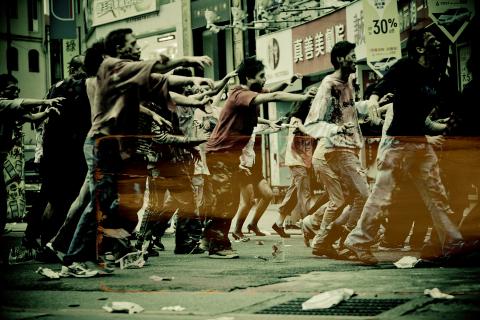Billed as the very first Taiwanese zombie movie, Zombie 108 (棄城Z-108) has generated lots of buzz among horror aficionados both at home and abroad. Nearly 900 people reportedly answered director Joe Chien’s (錢人豪) call to invest in the flick, whose budget clocked in at around NT$10 million. Later, two important players in the genre circuit, the Brussels International Fantastic Film Festival and Puchon International Fantastic Film Festival, picked the movie as part of their lineups this year.
With a more than adequate beginning that recalls many blockbusters of its kind, the self-proclaimed horror B-movie gets off to a good start. Yet the momentum soon dissipates as the movie struggles to flesh out its story.
The film starts with a familiar premise. There is a virus breakout, which is suggested in a sketchy opening sequence. And the next thing we know, Ximending becomes a zombie-infected neighborhood under quarantine. A SWAT team moves in to contain the situation in the seedy downtown area run by local gangs whose obese boss, played by Morris Rong (戎祥), the film’s producer, spends his days surrounded by cocaine and naked women. After a gunfight, the cops and gangsters form an uneasy alliance as they try to survive the flesh-eating undead.

Photo courtesy of Heyshine International
Meanwhile, young mother Linda (Yvonne Yao, 姚采穎) escapes the undead horde with her daughter but falls prey to a pervert, played by director Chien himself, who holds women as sex slaves in his basement.
Eventually, the survivors turn up at the pervert‘s apartment. A Japanese serial killer is thrown in for good measure.
To director Chien’s credit, the zombie assault scenes are well played out. There is also a good deal of gore and blood, though not quite as exciting as many horror fans would expect.

Photo courtesy of Heyshine International
The action sequences are enlivened with parkour and martial arts moves by Taiwanese taekwondo athlete Chu Mu-yen (朱木炎) and martial artist-turned-actor Dennis To (杜宇航) from Hong Kong, both playing SWAT cops. The idea of incorporating extreme sports and kung fu into the fight against zombies has great potential. But the film doesn’t take advantage of this and instead confines itself to a poorly written script revolving around a bevy of mostly dull characters.
The role of women in the zombie action is mostly utilized for torture porn sequences, and the casualness of the sexploitation is hard to stomach.
After making several unsuccessful genre flicks, including Button Man (鈕扣人) and Gangster Rock (混混天團), director Chien seems to be heading in the right direction, into B-movie territory, but he will need to deploy a lot more ingenuity than he shows in Zombie 108 to become a notable filmmaker of trashy movies.

Cheng Ching-hsiang (鄭青祥) turned a small triangle of concrete jammed between two old shops into a cool little bar called 9dimension. In front of the shop, a steampunk-like structure was welded by himself to serve as a booth where he prepares cocktails. “Yancheng used to be just old people,” he says, “but now young people are coming and creating the New Yancheng.” Around the corner, Yu Hsiu-jao (饒毓琇), opened Tiny Cafe. True to its name, it is the size of a cupboard and serves cold-brewed coffee. “Small shops are so special and have personality,” she says, “people come to Yancheng to find such treasures.” She

Late last month Philippines Foreign Affairs Secretary Theresa Lazaro told the Philippine Senate that the nation has sufficient funds to evacuate the nearly 170,000 Filipino residents in Taiwan, 84 percent of whom are migrant workers, in the event of war. Agencies have been exploring evacuation scenarios since early this year, she said. She also observed that since the Philippines has only limited ships, the government is consulting security agencies for alternatives. Filipinos are a distant third in overall migrant worker population. Indonesia has over 248,000 workers, followed by roughly 240,000 Vietnamese. It should be noted that there are another 170,000

Hannah Liao (廖宸萱) recalls the harassment she experienced on dating apps, an experience that left her frightened and disgusted. “I’ve tried some voice-based dating apps,” the 30-year-old says. “Right away, some guys would say things like, ‘Wanna talk dirty?’ or ‘Wanna suck my d**k?’” she says. Liao’s story is not unique. Ministry of Health and Welfare statistics show a more than 50 percent rise in sexual assault cases related to online encounters over the past five years. In 2023 alone, women comprised 7,698 of the 9,413 reported victims. Faced with a dating landscape that can feel more predatory than promising, many in

Former Chinese Nationalist Party (KMT) chairwoman Hung Hsiu-chu’s (洪秀柱) attendance at the Chinese Communist Party’s (CPP) “Chinese People’s War of Resistance Against Japanese Aggression and the World Anti-Fascist War” parade in Beijing is infuriating, embarrassing and insulting to nearly everyone in Taiwan, and Taiwan’s friends and allies. She is also ripping off bandages and pouring salt into old wounds. In the process she managed to tie both the KMT and the Democratic Progressive Party (DPP) into uncomfortable knots. The KMT continues to honor their heroic fighters, who defended China against the invading Japanese Empire, which inflicted unimaginable horrors on the